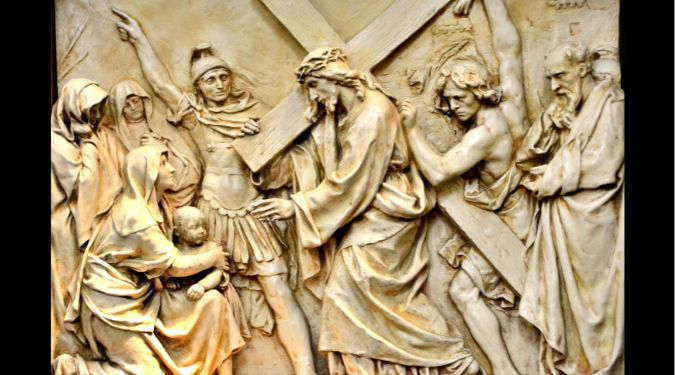Our Catholic Study Group encountered this passage in the Roman Catechism the other night:
By reason of this redemption we have received the Holy Ghost and have been made worthy of the grace of God. As a consequence of this gift we are the adopted sons of God, as the Apostle Paul wrote to the Romans when he said: Ye have not received the spirit of bondage again in fear, but you have received the spirit of adoption of sons, whereby we cry: “Abba, Father.” (Rom. 8: 15).
The Roman Catechism (McHugh, O.P. and Callan, O.P. 545)
St. Paul wrote something similar in his letter to the Galatians:
And because you are sons, God has sent the Spirit of his Son into our hearts, crying, “Abba! Father!”
Galatians 4:6
“Abba” is an Aramaic word that appears only 3 times in the New Testament. Besides the two aforementioned instances in the letters of St. Paul, we first hear the words on the lips of Jesus in the Garden of Gethsemane:
And he said, “Abba, Father, all things are possible to thee; remove this cup from me; yet not what I will, but what thou wilt.”
Mark 14:36
In each of the three instances, the original Koine Greek reads, “Ἀββᾶ ὁ Πατήρ”, literally, “Abba the Father”.
Pronounced “ab-BAH”, Abba is the Aramaic emphatic form of ‘ab, “father”, employed as vocative. Aramaic epistles indicate that it was a familiar address used by children (Mckenzie 1). The vocative case is used when addressing others and in these instances, when addressing God.
The word also appears in the Aramaic sections of the Book of Daniel in the Old Testament. See Daniel 5: 2, 11, 13, 18. In each instance the term refers to Belshazzar’s predecessor Nebuchadnezzar. “The usage of the term in these passages aligns with the common use of the Hebrew term for “father” (אָב, av) in reference to an ancestor, forebear, or predecessor.” (Barry, “Abba”)
So what can we conclude about the use of the word “Abba”? It means “father” in Aramaic, the native language of Jesus. It is used affectionately in a family context by children, young or adult, when addressing their fathers, but without any loss of respect. In English, this would seem to be close to “dear Father”, “Papa”, or perhaps “Dad”. Catholic apologist Scott Hahn says, “Abba was a familiar form of address used especially, but not only, by children, and denotes an intimacy between Jesus and the Father that is now available to us.” (Hahn,”Abba”)
Praise God!
Works Cited
Barry, John D., editor. The Lexham Bible Dictionary. Bellingham, WA, The Lexham Press, 2016.
Hahn, Scott, editor. Catholic Bible Dictionary. Random House Publishing Group, 2009.
McHugh, O.P., John A., and Charles J. Callan, O.P., translators. Catechism of the Council of Trent. Charlotte, NC, Tan Books, 2009.
Mckenzie, John L. The Dictionary Of The Bible. New York, Macmillan Publishing Co., Inc., 1965.





